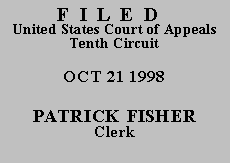

| RENEE CORNELISEN,
v.
NEAL GUNNARSON |
|
Before SEYMOUR, BRORBY, and BRISCOE,
Circuit Judges.
After examining the briefs and appellate record, this panel has determined
unanimously that oral argument would not materially assist the determination of
this appeal. See Fed. R. App. P. 34(a); 10th Cir. R. 34.1.9. The case is therefore
ordered submitted without oral argument.
Renee Cornelison is a pro se litigator whose complaint was dismissed without prejudice for lack of jurisdiction and failure to state a claim on which relief may be granted.
Plaintiff sued alleging Defendant violated her First Amendment rights
by deliberately, and with malice, removing and/or destroying innumerable copies of The City Weekly, a local newspaper.... That Defendant's actions caused grievous harm to Plaintiff, because, that ... issue contained Plaintiff's published letter, and Defendant's censorship thereof violated the terms of a Free Press, as guaranteed to Plaintiff by the First Amendment of The Constitution of the United States ....
(Emphasis in original.) Defendant filed a motion to dismiss claiming the court lacked jurisdiction and the complaint failed to state a claim on which relief may be given.
The trial court, in a thorough eight-page ruling, set forth a lesson in pleading for Plaintiff. First, the trial court announced Plaintiff's claim "does appear to arise under the Constitution" and then stated "Plaintiff should, nevertheless, allege that her claims arise under the Constitution ... of the United States." The trial court proceeded to inform Plaintiff "the protections provided by the Constitution are protections against infringement by the government .... [A] party must allege an action by the state or federal government." The trial court then informed Plaintiff the conduct must involve "'using the badge of [Plaintiff's] authority' to effect the constitutional infringement alleged to have occurred." (Quoting Wyatt v. Cole, 504 U.S. 158, 161 (1992)). The trial court then granted Defendant's motion and dismissed the complaint without prejudice.
Plaintiff appeals this decision asserting the trial court failed to: (1) "give Plaintiff the opportunity to submit affidavits, and extraneous proofs as required and indeed did take Plaintiff by surprise"; and (2) tell the truth in his judgment by reciting "[t]his action came to trial or hearing before the Court. The issues have been tried or heard and a decision has been rendered." Stated somewhat differently, Plaintiff accuses the trial court of lying by entering this "false" statement in its order.
Plaintiff misperceives the law. The trial court very patiently and clearly instructed Plaintiff as to the essential contents of a complaint. Specifically, the trial court provided a basic and fundamental analysis of the requirements for jurisdiction and constitutional causes of action taken against governmental entities. A copy of the district court's ruling on this case is attached hereto. The district court dismissed the complaint without prejudice, thereby extending to Plaintiff the opportunity to file a corrected complaint. We will not delve into the question of the finality of an order dismissing a complaint without prejudice, as this might add to the confusion.
Additionally, Plaintiff fails to understand the meaning of the word "hearing" as employed by the trial court. The trial court specifically stated: "The court has reviewed the pleading and ... will determine the matter based on the written memoranda of the parties without the assistance of oral argument." That is, of course, a "hearing." The district court's rules specifically provide, in part, that "motions are to be submitted to and will be determined by the court on the basis of the written memoranda of the parties." District of Utah Civil Rule 7-1(f).
As to the dismissal of the complaint, we review dismissals for failure to state a claim de novo. See Pelt v. Utah, 104 F.3d 1534, 1540 (10th Cir. 1996). Hence, we scrutinize Plaintiff's complaint as if we are the trial court. Id. On such review, and for substantially the same reasons set forth by the district court in its ruling dated March 13, 1998, the judgment of the district court is AFFIRMED.
Entered by the Court:
WADE BRORBY
United States Circuit Judge
Attachment not available electronically.
*. This order and judgment is not binding precedent except under the doctrines of law of the case, res judicata and collateral estoppel. The court generally disfavors the citation of orders and judgments; nevertheless, an order and judgment may be cited under the terms and conditions of 10th Cir. R. 36.3.